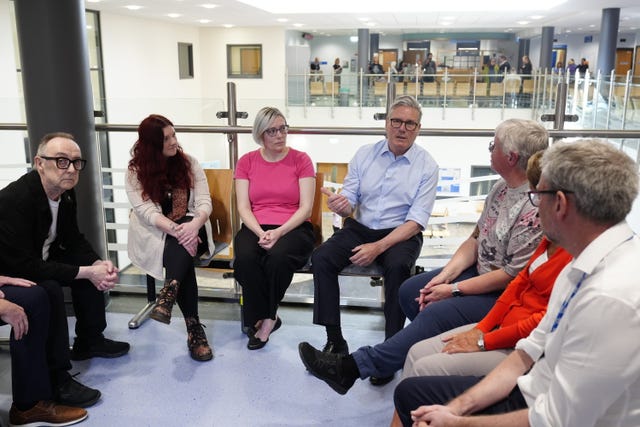Prescription charges in England frozen for first time in three years – Starmer
The Government said the move will save patients around £18 million next year.

Prescription charges in England will be frozen for the first time in three years, the Prime Minister has announced.
Prices will stay at £9.90 per item while three-month and annual pre-payment certificates will also be frozen for 2025/26.
A three-month prescription pre-payment certificate (PPC) will have the same cost as now, at £32.05, while a 12-month one will remain at £114.50.
The cost of the hormone replacement therapy (HRT) certificate is also frozen.
The Government said the move will save patients about £18 million next year while those already exempt from paying prescriptions will continue to be so.
Sir Keir Starmer announced the freeze on a visit to a health centre in Rossendale, Lancashire.
He said: “Today we are freezing prescription charges so that means they won’t go over £10 and that is really significant, because very many people have to pay for prescriptions.
“There’s a sort of cost-of-living crisis that is still very challenging for people, so this is an important measure in that.
“It’s not the only measure of course – we are taking steps on school uniforms to limit the cost of school uniforms, we’re driving up the minimum wage, we’ve got breakfast clubs coming on stream, that’s something we announced last week, which will save families about £450.
“Each of these, in their incremental way, will ease the pressure that people feel because of the cost-of-living crisis.”
Health and Social Care Secretary Wes Streeting said: “This Government’s plan for change will always put working people first and our moves today to freeze prescription charges will put money back into the pockets of millions of patients.

“Fixing our NHS will be a long road – but by working closer with our pharmacies we’re saving money and shifting care to the community where it’s closer to your home.
“We made the difficult but necessary choices at the budget to fund moves like this and change our NHS so it can once again be there for you when you need it.”
Chancellor Rachel Reeves said: “We promised to build an NHS fit for the future and that started with the £26 billion funding boost I delivered at the budget, to repair and improve the many vital services it provides.
“Since then, waiting lists are falling, staff are better paid and supported, and today £18 million has been kept in patient’s pockets by freezing prescription charges – easing the cost of living through our plan for change, delivering for all.”
Nick Kaye, chairman of the National Pharmacy Association, which represents 6,000 independent pharmacies, called for the abolition of charges.
He said: “It is good news for patients and pharmacies that the Government has taken the step to freeze the prescription charge today for the first time in three years.
“However, we’ve long called for the prescription charge to be scrapped, which acts as a barrier to some patients accessing vital medication and this is something we’d urge the Government to work towards.
“As pharmacists, we are health care professionals and have no interest in being tax collectors.”
Groups already exempt from prescription charges include children under 16 and those aged 16-18 in full-time education; people aged 66 and over; pregnant women and those who have had a baby in the last 12 months; people with specified medical conditions like diabetes or cancer and have valid exemption certificates.
Those receiving some benefits and NHS inpatients also receive free prescriptions.





